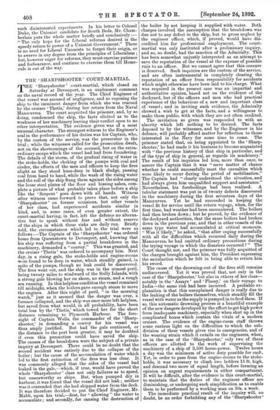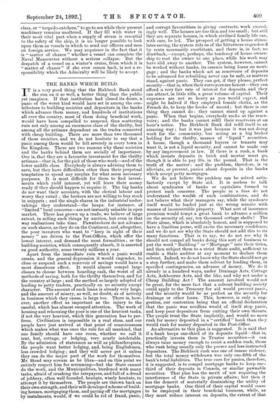THE ' SHARPSHOOTER' COURT-MARTIAL.
T"Sharpshooter ' court-martial, which closed on Saturday at Devonport, is an unpleasant comment on the naval record of the year. The Chief Engineer of that vessel was accused of negligence, and so exposing the ship to the imminent danger from which she was rescued by the cruiser Thetis,' during her return from the Naval Manceuvres. The court acquitted the prisoner, and, by so doing, condemned the ship, the facts elicited as to the weakness of her machinery leaving their verdict open to no other interpretation. The evidence given was of a most unusual character. The strongest witness to the Engineer's zeal in the performance of his duties was his Captain, who, by the custom of the service, was the prosecutor in the trial ; while the witnesses called for the prosecution dwelt, not on the shortcomings of the accused, but on the extra- ordinary escape which the vessel had had from foundering. The details of the storm, of the gradual rising of water in the stoke-holds, the choking of the pumps with coal and cinder, the efforts of the men and officers to keep the fires alight as they stood knee-deep in black sludge, passing coal from hand to hand, while the wash of the rising water and the roll of the ship flung them against the sides among the loose steel plates of the floor and hissing ashes, com- plete a picture of what probably takes place before a ship like the ' Serpent' goes down with all hands. Witness after witness came forward to prove that, not only the Sharpshooter' on former occasions, but other vessels of her class, had experienced accidents similar in kind, and, in some cases, of even greater extent, the .court-martial having, in fact, left the defence no alterna- tive but to speak without fear and without reserve -of the ships in which these risks are daily run. Briefly told, the circumstances which led to the trial were as follows :—The Captain of the 'Sharpshooter' was ordered home from Queenstown to Devonport, and, knowing that his ship was suffering from a partial breakdown in the machinery, demanded a "convoy." This was granted, and the cruiser Thetis' was ordered to accompany him. Next -day, in a rising gale, the stoke-holds and engine-rooms were found to be deep in water, which steadily gained, in spite of the pumps, though no leak could be discovered. The fires went out, and the ship was in the utmost peril, being twenty miles to windward of the Scilly Islands, with a strong gale blowing her on shore, no steam, and a rough sea running. In this helpless condition the vessel remained till midnight, when the boilers gave enough steam to move the engines. After this night of peril, " in the morning watch," just as it seemed that the danger was over, a furnace collapsed, and the ship was once more left helpless, but saved from what would, in all probability, have been total loss by the Thetis,' which towed her for the short distance remaining to Plymouth Harbour. The fore- sight of Captain Wells, the commander of the ' Sharp- shooter,' in demanding a convoy for his vessel was thus amply justified. But had the gale continued, or the distance to the port been greater, it may be doubted if even this precaution could have saved the ship. The causes of the breakdown were the subject of a private inquiry at Devonport. There could be no doubt that the second accident was entirely due to the collapse of the boiler; but the cause of the accumulation of water which led to the first extinction of the fires was less clear. It was commonly alleged that the sides of the vessel had leaked in the gale,—which, if true, would have proved the whole 'Sharpshooter' class not only failures as to speed, but unseaworthy as ships. But, when pumped dry in harbour, it was found that the vessel did not leak ; neither was it contended that she had shipped water from the deck. It was therefore decided to put the Chief Engineer, Mr. Mabb, upon his trial,—first, for " allowing " the water to accumulate ; and secondly, for causing the destruction of the boiler by not keeping it supplied with water. Both charges involved the assumption that the breakdown was due not to any defect in the ship, but to gross neglect by the engineer officer, which, if proved, would have dis- credited him for professional employment. The court- martial was only instituted after a preliminary inquiry, and so, no doubt, had the sanction of the Admiralty. This has been somewhat unjustly interpreted as an attempt to save the reputation of the vessel at the expense of possible ruin to an officer. But we cannot agree that this censure is deserved. Such inquiries are the custom of the service, and are often instrumental in completely clearing the reputation of an officer from responsibility for accidents which might otherwise have been laid to his charge. What was required in the present case was an impartial and authoritative opinion, based not on the evidence of the dockyard, but of the officers and men who had practical experience of the behaviour of a new and important class of vessel ; and in inviting such evidence, the Admiralty showed a wish to get at the facts, and a willingness to make them public, with which they are not often credited. The invitation so given was responded to with an alacrity which left nothing to be desired. The facts deposed to by the witnesses, and by the Engineer in his defence, will probably afford matter for reflection to those interested in the Navy for some time to come. The prisoner stated that, on being appointed to the Sharp- shooter,' he had made it his business to become acquainted with " the previous history of that ship in particular, and of the type of ship in general, as regards its machinery." The result of his inquiries led him, more than once, to assure the Captain that it was " mere matter of chance whether he could successfully meet the casualties which were likely to occur during the period of mobilisation." The Captain had " clearly understood the situation, and had always given him unqualified support and assistance." Nevertheless, his forebodings had been realised. A tabular statement was put in of twenty defects discovered in the machinery during the first seventeen days of the Manceuvres. Yet he had succeeded in keeping the vessel fit for service until the return voyage, when, for the first time, bad weather had been encountered. The boilers had then broken down ; but he proved, by the evidence of the dockyard authorities, that the same boilers had broken down in the previous year, and that in other vessels of the same type water had accumulated at critical moments. " Was it likely," he asked, "that after coping successfully with all the difficulties which recurred daily during the Manoeuvres, he had omitted ordinary precautions during the trying voyage in which the disasters occurred ? " The Court thought not, and the prisoner was fully acquitted of the charges brought against him, the President expressing the satisfaction which he felt in being able to return him his sword.
The cause of the drowning-out of the fires still remains undiscovered. Yet it was proved that, not only in the case of the Sharpshooter,' but also in others of her class— notably in the Assaye ' and ' Plassy,' on their voyage to India—the same risk had been incurred. A probable ex- planation is that this unexplained danger is really due to the leaking of the boilers themselves, which steadily fill the vessel with water as the supply is pumped in to feed them. If so, this automatic drowning process is a beautiful example of the new dangers developed by the effort to get high power from inadequate machinery, especially when shut up in the complicated boxes which contain the vitals of a modern cruiser. The evidence of the engine-room staff throws some curious light on the difficulties to which the sub- division of these vessels gives rise in emergencies, and of the wearing strain which it entails on the engineers, when, as in the case of the 'Sharpshooter,' only two of these officers are allotted to the work of supervising the machinery of a ship of 3,500 horse-power. Twelve hours a day was the minimum of active duty possible for each. Yet, in order to pass from the engine-rooms to the stoke- holds, it was necessary to climb two ladders 15 ft. high, and descend two more of equal length, before forming an opinion on urgent requirements in either compartment. It will be difficult, after the evidence in this court-martial, to maintain that the duties of the engineer officer are diminishing, or undergoing such simplification as to enable them to be performed by a working man on 30s. a week.
The immediate practical result of the inquiry will, no doubt, be an order forbidding any of the Sharpshooter' class, or " torpedo-catchers," to go to sea while their present machinery remains unaltered. If they fill with water in their most vital part when a supply of steam is essential to the safety of the ship, it is no longer possible to look upon them as vessels in which to send our officers and men on foreign service. We may acquiesce in the fact that it is " matter of chance " whether a vessel can complete the Naval Manoeuvres without a serious collapse. But the despatch of a vessel on a winter's cruise, from which it is "matter of chance" if she ever comes back, is not a re- sponsibility which the Admiralty will be likely to accept.



































 Previous page
Previous page